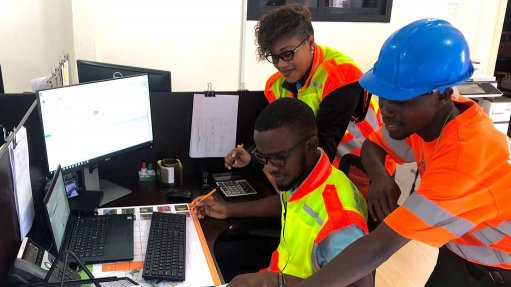
KITWE WAREHOUSE Weir Minerals Africa keeps extensive stock of fast-moving wet-end components at its Zambian warehouse to support the Weir product footprint across the country
As Zambian mines move to adopt more sustainable mining practices, the reduction of energy use, water consumption and carbon emissions –as per global mining trends – is a significant priority, says original-equipment manufacturer (OEM) Weir Minerals Africa Rest of Africa sales director Pieter van den Berg.
“Customers want reliable, highly engineered equipment that supports their operational goals, enhancing throughput while reducing plant downtime and keeping capital expenditure low while supporting their sustainability agenda.”
With Africa slow to adopt new technologies, Weir Minerals Africa is focused on adding value through its existing products to support its Zambian customers in their sustainability drive.
For example, Weir Minerals’ Warman wear-resistant technology (WRT) impeller and throatbush combination allows for the upgrade of existing Warman slurry pumps.
“This combination is designed to increase wear life between 30% and 50%, and improves the longevity of parts, consequently delivering reduced energy consumption, higher efficiency and lower total cost of ownership for mines,” explains Van den Berg.
The WRT impeller and throatbush combination also reduces power consumption, which is a substantial concern in Africa. International development agency USAID estimates that only 4% of Zambia’s rural population has access to power.
The upgraded Warman pump components have been installed at more than half of the country’s copper mines, says Van den Berg.
While there is a need for water reclamation in Zambia, owing to substantially high rainfall in the wet season, the country’s many opencast mines also need dewatering solutions.
Weir Minerals offers its range of Multiflo custom-designed dewatering pontoons and barges for efficient, reliable dewatering.
“Effective water use is a notable priority for our customers. “Therefore, the dewatering pontoon solution is aimed at reducing overall water consumption and improving the efficiency of usage requirements,” notes Van den Berg, emphasising that Weir Minerals Africa successfully installed large pontoons at one of the biggest copper operations in Zambia in August last year.
Further, Weir Minerals’ Enduron high-pressure grinding rolls can help to improve water consumption, as the solution does not use any water.
An energy saving of up to 40% can be achieved, compared with those of conventional milling processes, states Van den Berg. However, Zambian mines have yet to invest in this technology.
Serious about Training
Weir Minerals Africa has taken on four recently qualified Zambian graduates as part of the two-year graduate programme it launched in mid-2021.
Recently qualified engineers, including metallurgists, process and mechanical engineers, are given the opportunity to gain experience and skills by working in the field with Weir Minerals Africa employees over the period.
The four graduates are expected to complete the programme in June 2023, after which they will have the skills and experience necessary to set them apart from their peers in the job market, explains Van den Berg.
The company also invests significantly in the skills of its in-country staff through training conducted locally and abroad, with ready access to Weir Minerals’ pool of expertise internationally.
“Being a multinational company, we have training platforms that are linked to universities worldwide, enabling us to provide our staff with the best technical training possible,” says Van den Berg.
Weir Minerals Africa’s Zambian team also travelled to South Africa in March for a week to gain a holistic understanding of process applications through the company’s Mill Circuit University.
Service Delivery
Active in Zambia for more than 20 years, Weir Minerals also continuously invests in its leased in-country facility, in Kitwe, to effectively support local mines’ needs, highlights Van den Berg.
“At the time, Kitwe was the most central location to local mines, and one of the better developed industrial hubs. Many of the freight-forwarding companies servicing local mining operations are also located in the city. Nonetheless, permanent Weir Minerals Africa employees also live on the doorstep of Solwezi, where most of the country’s mines are concentrated.”
Weir Minerals Africa offers a myriad of services, including full-time, on-site service technicians to help with the maintenance of equipment at mines, with the company’s expert technicians also presenting numerous on-site or virtual training courses to upskill junior mine employees, highlights Van den Berg.
Weir Minerals Africa’s Zambian engineering skills set also affords customers on-site plant or process audits that reveal upstream and downstream problem areas so that an integrated solution can be created to address the root cause.
“This solution might not involve new equipment, as making slight changes to existing equipment by upgrading components can add value to operations,” elaborates Van den Berg.
Weir Minerals Africa keeps extensive stock of fast-moving wet-end components at its Zambian warehouse to support the Weir product footprint across the country, improving turnaround time for service and repairs. Shorter lead times enable mines to decrease their stockholding and improve their working capital position, he emphasises.
In addition, Weir Minerals Africa ensures that it has the correct equipment available, such as bearing test rigs, for the safe testing of equipment repaired, at its Kitwe facility.
The company’s comprehensive in-country stockholding is aided by the ease of transport between South Africa and Zambia, even during hard Covid-19 lockdowns. Despite standard Covid-19 delays –which involved the antigen testing of drivers – over the past two years, Weir Minerals Africa still maintains an average eight-day delivery period from its main supply hub in South Africa to Zambia, Van den Berg concludes.